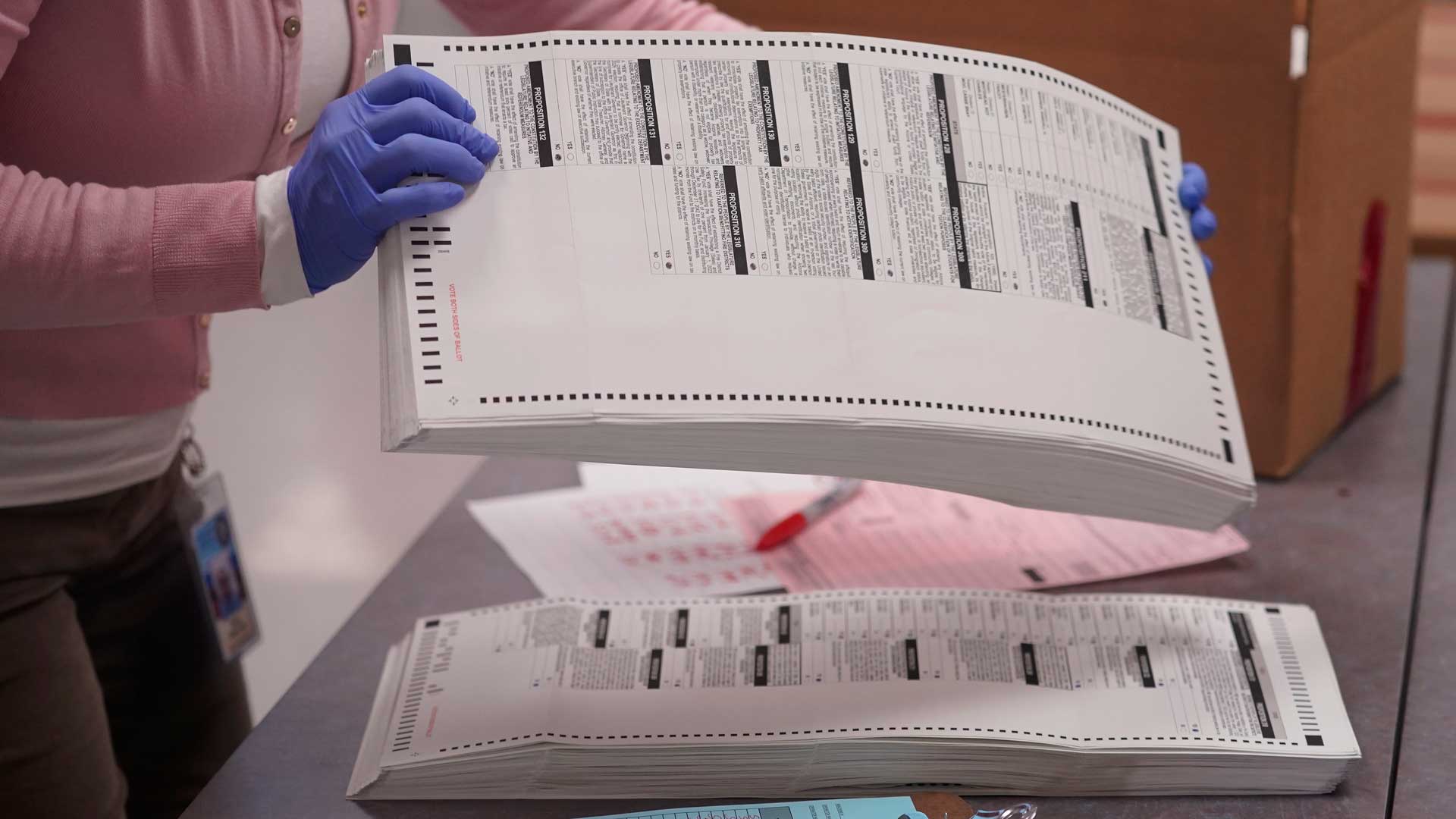 An election worker gathers tabulated ballots to be boxed inside the Maricopa County Recorders Office, Thursday, Nov. 10, 2022, in Phoenix.
An election worker gathers tabulated ballots to be boxed inside the Maricopa County Recorders Office, Thursday, Nov. 10, 2022, in Phoenix.
Arizona Governor Katie Hobbs announced the publication of the Bipartisan Elections Task Force's report Wednesday, where the 18-member task force proposed changes to enhance the recruitment of Arizona’s election workers and changes to the law regarding early voting, voter registration and voting rights.
The 69-page report proposed changing state law to automatically restore the voting rights of convicted felons once released from incarceration.
"But current law regarding the qualifying convictions and procedures is confusing and results in the mistaken belief of ineligibility," according to the report. "This proposal would amend the law to make the voting rights restoration process automatic upon release from incarceration, regardless of whether an individual has one felony conviction or multiple."
The report also proposed changing the law to make election officer certification training available every year instead of every other year to help more election officials get certified ahead of elections.
"Arizona law currently limits election officer certification training to odd-numbered years," as stated within the report. "This limits Arizona’s pool of certified election officers by preventing training and on-boarding of new officers during election years."
The report noted that the law requires local election officials at the city and county level are required to reimburse the Secretary of State for election officer certification training, which the task force argues "disincentivizes their participation." The proposal suggests removing the fee.
While this change would cost the Secretary of State's office more money, the report asserts "such increases would be minimal."
Another proposal in the election worker recruitment arena is the recommendation by the task force to have local jurisdictions develop an election-focused paid internship or fellowship program that gives college and graduate school graduates to earn work experience.
The report also looked at methods to recruit more poll workers. One proposal suggests that government and private employers create incentives for their employees to serve as poll workers.
"Recommendations include government employers allowing employees to take paid time off to serve as poll workers and attend training, and private sector employers offering paid or unpaid time off for employees who serve as poll workers," according to the report. "Companies could also offer other incentives, like providing flexible work hours or remote work options during the election period, recognizing and celebrating employees who serve as poll workers, and offering free child care or transportation services to employees who serve as poll workers."
Another proposal suggests creating a poll worker communication platform that aims to streamline communication both prior to and on election day.
"(The) Application functionality could include scheduling training, recruiting poll workers based on previous service, sending mass text messages, tracking issues to resolution, and providing feedback on job performance and organization," the report stated.
In an effort to get more Arizonians registered to vote, the report recommended changing the law to require making the provisional ballot form also serve as a voter registration form — a practice already implemented in some counties according to the report.
"In these counties, if the post-election review of the provisional ballot determines that the person was not properly registered to vote, the ballot would not be counted for that election, but the voter can be registered to vote for future elections," as stated in the report. "However, there is no statutory requirement for counties to adopt this practice, which can result in inconsistent treatment of similarly-situated voters in different counties, and a potential decrease in the practice with turnover in County Recorder and elections offices."
The report also calls for a change in the law regarding "emergency voting," which is reserved for the last weekend before election day; voters are required to submit an affidavit stating their emergency that prohibits them from voting on election day. The task force's proposal seeks to change the name from "emergency voting," to "final weekend voting."
"Which does not extend the time period for voting, but instead expands the eligibility of who can vote on that final weekend," according to the report. "This proposal would also help address the problem of “late early” ballots, particularly in counties that may offer on-site tabulation."
The Arizona Governor created the task force in January of this year via executive order. It's 18-members include county recorders, city clerks, the Secretary of State, attorneys and current and former elections directors.



By submitting your comments, you hereby give AZPM the right to post your comments and potentially use them in any other form of media operated by this institution.